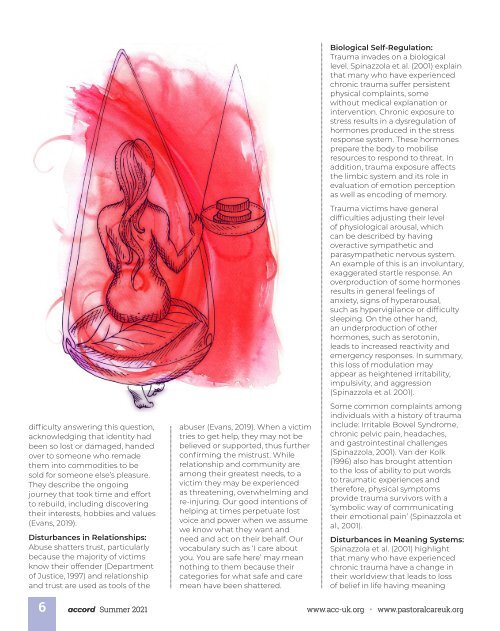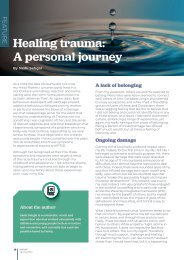ACC Accord Summer 2021 Issue 111
You also want an ePaper? Increase the reach of your titles
YUMPU automatically turns print PDFs into web optimized ePapers that Google loves.
difficulty answering this question,<br />
acknowledging that identity had<br />
been so lost or damaged, handed<br />
over to someone who remade<br />
them into commodities to be<br />
sold for someone else’s pleasure.<br />
They describe the ongoing<br />
journey that took time and effort<br />
to rebuild, including discovering<br />
their interests, hobbies and values<br />
(Evans, 2019).<br />
Disturbances in Relationships:<br />
Abuse shatters trust, particularly<br />
because the majority of victims<br />
know their offender (Department<br />
of Justice, 1997) and relationship<br />
and trust are used as tools of the<br />
abuser (Evans, 2019). When a victim<br />
tries to get help, they may not be<br />
believed or supported, thus further<br />
confirming the mistrust. While<br />
relationship and community are<br />
among their greatest needs, to a<br />
victim they may be experienced<br />
as threatening, overwhelming and<br />
re-injuring. Our good intentions of<br />
helping at times perpetuate lost<br />
voice and power when we assume<br />
we know what they want and<br />
need and act on their behalf. Our<br />
vocabulary such as ‘I care about<br />
you. You are safe here’ may mean<br />
nothing to them because their<br />
categories for what safe and care<br />
mean have been shattered.<br />
Biological Self-Regulation:<br />
Trauma invades on a biological<br />
level. Spinazzola et al. (2001) explain<br />
that many who have experienced<br />
chronic trauma suffer persistent<br />
physical complaints, some<br />
without medical explanation or<br />
intervention. Chronic exposure to<br />
stress results in a dysregulation of<br />
hormones produced in the stress<br />
response system. These hormones<br />
prepare the body to mobilise<br />
resources to respond to threat. In<br />
addition, trauma exposure affects<br />
the limbic system and its role in<br />
evaluation of emotion perception<br />
as well as encoding of memory.<br />
Trauma victims have general<br />
difficulties adjusting their level<br />
of physiological arousal, which<br />
can be described by having<br />
overactive sympathetic and<br />
parasympathetic nervous system.<br />
An example of this is an involuntary,<br />
exaggerated startle response. An<br />
overproduction of some hormones<br />
results in general feelings of<br />
anxiety, signs of hyperarousal,<br />
such as hypervigilance or difficulty<br />
sleeping. On the other hand,<br />
an underproduction of other<br />
hormones, such as serotonin,<br />
leads to increased reactivity and<br />
emergency responses. In summary,<br />
this loss of modulation may<br />
appear as heightened irritability,<br />
impulsivity, and aggression<br />
(Spinazzola et al. 2001).<br />
Some common complaints among<br />
individuals with a history of trauma<br />
include: Irritable Bowel Syndrome,<br />
chronic pelvic pain, headaches,<br />
and gastrointestinal challenges<br />
(Spinazzola, 2001). Van der Kolk<br />
(1996) also has brought attention<br />
to the loss of ability to put words<br />
to traumatic experiences and<br />
therefore, physical symptoms<br />
provide trauma survivors with a<br />
‘symbolic way of communicating<br />
their emotional pain’ (Spinazzola et<br />
al., 2001).<br />
Disturbances in Meaning Systems:<br />
Spinazzola et al. (2001) highlight<br />
that many who have experienced<br />
chronic trauma have a change in<br />
their worldview that leads to loss<br />
of belief in life having meaning<br />
6 accord <strong>Summer</strong> <strong>2021</strong> www.acc-uk.org • www.pastoralcareuk.org



